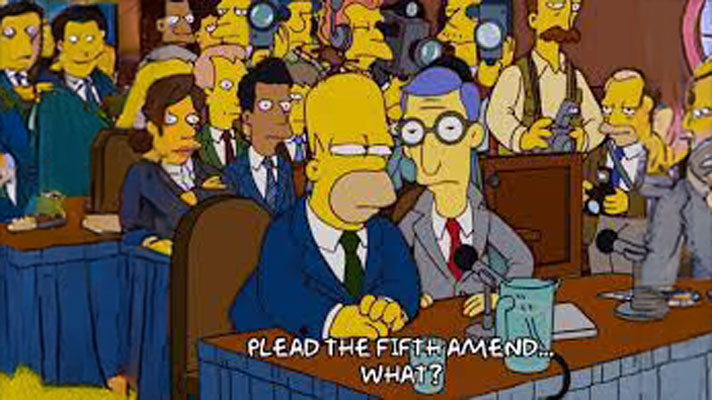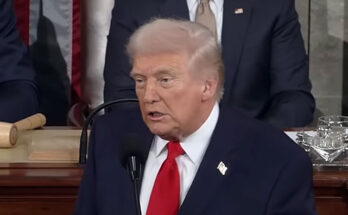“No person shall be held to answer for a capital, or otherwise infamous crime, unless on a presentment or indictment of a grand jury… nor be deprived of life, liberty, or property, without due process of law.”
5th Amendment, United States Constitutio
Column By Mike Bibb
In an effort to enhance the presence of the millions of undocumented migrants who were allowed to illegally enter the country under the Biden Administration, the Left’s press and attorneys has taken to insisting the 5th Amendment’s “liberty” and “due process” provisions protects them from being expelled because they haven’t been properly indicted and tried for the alleged crime.
In other words, the 12-15 million folks, from all parts of the globe, who unlawfully scampered across our southern border, or purposely flew in, are insisting they should now receive taxpayer legal assistance to refute the return to their country of origin.
12-15 million indictments and trials for people who shouldn’t be here in the first place.
That’s their basic argument, because they believe the 5th Amendment says they’re allowed to have their day in court.
To their way of thinking, it doesn’t matter if the person is from the Congo, Afghanistan, India, China, Venezuela, Russia, Iran or from any other country on Earth, as long as they are now in the United States, they are automatically entitled to all the civil benefits and protections guaranteed within the Constitution.
Or at least, that’s their dispute — and they will have no difficulty finding lawyers to argue their case.
Well, just a minute. Article I, Section 8 of the same Constitution, which precedes the 5th Amendment, says “Congress shall . . . establish a uniform rule of naturalization.”
Which they have done, and it doesn’t include the uncontrolled entry of massive numbers of foreign aliens marauding their way into the interior of our country.
As a result, the assumed safeguards and guarantees found within the 5th Amendment are not applicable to anyone else except citizens of the United States, its territories and those who are lawfully here.
Nowhere, within the Constitution, does it state anyone can enter the United States and immediately be entitled to all the benefits and protections available to its citizens.
That fantasy just doesn’t exist and never has — regardless of Joe Biden’s muddled misconceptions or the “Give me your tired, poor and huddled masses” sonnet emblazoned on a plaque inside the Statue of Liberty at the entrance of New York Harbor.
It’s a popular phrase, but it’s not the law.
Seems logical and shouldn’t be overly difficult to figure out. Except when dealing with the government, logic and common sense are not necessarily prerequisites to promoting a special interest, social cause or political agenda.
Unfortunately, the judicial system has increased its influence in areas where it is not authorized. A court is supposed to decide if a law or ruling is valid in accordance with standing statutes, procedures, and the Constitution. Including the judge’s sworn oath to interpret and uphold the law and rulings as mandated by Article VI.
Usually, the integrity of a law is challenged by someone and heard before a court and a judge. The merits or demerits of the case are then discussed and decided, and a ruling is rendered by a jury and/or judge.
If a district court judge decides he doesn’t agree with a Presidental Executive Order, he cannot nullify it or change it to his liking. He/she doesn’t have the authority. His province is limited to his specific district and courtroom — not the entire United States, and not the Presidency.
Plus, a district court judge is an appointed position by the President and Congress. It is not an occupation decided by popular vote or party affiliation.
If a district judge doesn’t like a law, he/she can voice his/her opinion to an appeals court and, if necessary, the Supreme Court.
Unless the federal immigration laws are proven to be lawfully faulty, a district court judge is not permitted to change or rule against them. He is not a legislator.
Which means, if a foreign individual decides to intentionally walk across our borders without going through a proper port-of-entry or crossing point, then he/she has already violated our immigration laws. A judge’s decision cannot change that or make it less illegal than it is.
Consequently, if a President decides to issue an Executive Order requiring the Border Patrol and Immigration and Customs Enforcement round up and return the border violators to their proper country, that is Constitutionally permissible.
The President is the highest federal elected official in the land and Commander-in-Chief of all the armed forces. His main job is to protect and defend the country and the Constitution.
A federal judge wasn’t elected by anyone but takes a similar oath as the President. The oath makes no mention of coddling foreign immigrants or attempting to overrule a Presidential order.
If a federal judge is suddenly offended by his or her lack of influence and authority or believes he/she is entitled to more jurisdiction than constitutionally limited, then maybe they should submit a resume to two or three of the popular online employment agencies.
I’m sure there must be a few jobs out there that they can do that would be more compatible with their presumed importance and swollen egos.
Admittedly, being a federal judge is a big deal, but it’s not as big as being President. A reality-check that’s gotta stick in their craw!
The opinions expressed in this editorial are those of the author.








